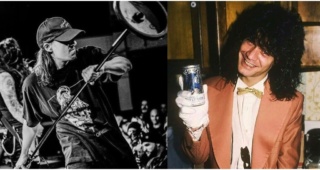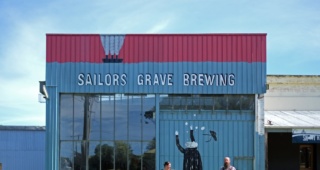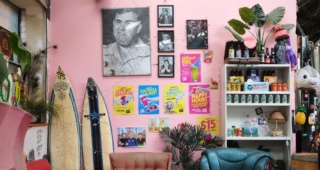On a chilly December evening at Hammerton Brewery’s own House of Hammerton pub, pints of the brewery’s exceptional Pentonville oyster stout flow freely as we meet Matthew Curtis and Will Hawkes for a wide-ranging chat about all things beer in London and the UK… or at least that’s where it started.
Curtis (the sexy quiffed lad, left) and Hawkes (the sexy ’70s Australian surfer/swinger, right) are, in fact, two of London’s finest–and, to the benefit of this two-part interview, most opinionated–authorities and writers on beer. Stand-up blokes, too. So as the world plunges into 2018, we pick the brains of these dapper gentlemen to give you, dear readers, a pulse on the London and UK brewing scene, and to help create a roadmap for your beery UK travels.
We touch on some of Britain’s best and most promising breweries, places to drink proper ale in London, the proud roots of London’s storied beer culture, and much more. Grab a beer and settle in–we think you’ll enjoy this as much as we did.
Part II of our chat is now up for your reading pleasure, as well.
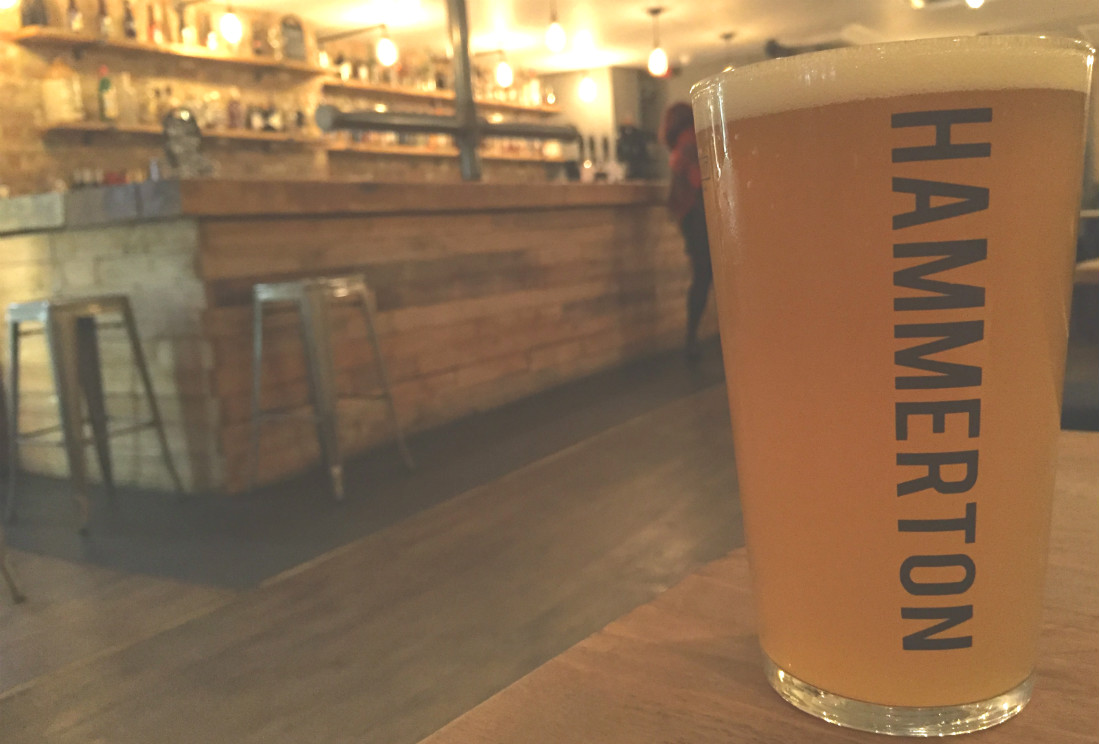
Beer Travelist: Which one or two London breweries killed it the most in 2017?
Matthew Curtis: I can pick one very easily and very quickly, which is Burning Sky. They’re one of the most underrated breweries in the world; what Mark Tranter, Tom Dobson and the rest of the team do down there is pretty amazing. They actually have a core saison—every batch is different—but they actually have a foeder saison as a core beer. They’ve improved their hoppy beers, as well, and they installed the first coolship since the 1930s, or at least there’s no recorded history to say otherwise. They’re also producing spontaneously fermented beer, of which we’re going to start seeing the results maybe this year, maybe next year.
What they’re doing is very understated, but it’s not just the beer they’re making; they have a lifestyle. It’s a cool little thing.
Also, I love what Marble Brewery did in 2017. A few years ago Marble was starting to lose a little relevance, and they’ve definitely looked at themselves and breweries like Cloudwater down the road, which I think was a big eye-opener for them. That Mancunian spirit shone through, and head brewer James Kemp developed some recipes that brought Western classics. They collaborate with everyone, but the real highlight was working with Fuller’s on Gale’s Prize Old Ale. They got the original yeast strain that Fuller’s had been keeping in a tank and brewed a batch of that, split into four different types of barrel, and produced some fantastic old ale.
Mark Tranter and James Kemp really set a standard for me last year.
Will Hawkes: In terms of a brewery that’s really improved and doing good stuff now it’s Gipsy Hill Brewing Company. It’s a brewery that’s been around for a number of years, and it’s really starting to hit its stride now. I don’t think they’re necessarily doing anything particularly sexy, but what they’re doing is really good, consistent beer, and that’s probably what the British market needs now: good, consistent pale ale, porter, or whatever.
Another brewery exciting me, partly for personal reasons, is Breakwater Brewery Company in Dover. Phil Lowry is a mate of mine, and his knowledge of brewing is just way beyond a lot of the British brewers. He knows lots of guys out in California, Germany, Belgium, Czech Republic, all over the world. He’s a very understated bloke with a huge beard, and like me he’s from Kent, so I’m glad to see him be a part of a small brewery in Dover that’s sort of trying to restore a little bit of that Kentish traditional brewery. For me that’s meant a lot.
[Ed. Note: After publishing this interview we learned that Lowry is no longer involved with Breakwater Brewery. Hawkes says it’s “still going strong,” however, and is still worth watching.]
BT: Similarly, which ones do you feel are poised for big things in 2018?
Curtis: Burnt Mill Brewery in Suffolk have been a real revelation. They hired Sophie de Ronde from Muntons, and they came out of the gate not just with some very well-made beers, but they looked at where the beer market is and where’s it’s going, and they then produced the range of beers that fit with that in a package that looked right. They’re only just getting started, so it’s really exciting.
[Ed. Note: Just before this interview went to press, Burnt Mill was voted England’s best new brewery in 2017 at the RateBeer awards.]
Duration Brewing will open. They’re exceptional at marketing themselves, but the truth is that [co-founder] Derek Bates is a very good brewer and he’ll have the resources to do some very special things. I mean, they can’t fuck up now anyway; everyone is expecting really good stuff.
Left Handed Giant in Bristol are really starting to kick into gear. They’ve been in their own brewery for about three months, they’re doing some really good beers, and they’re one to keep an eye on.
Hawkes: The one brewery I’m most looking forward to is the one that the former head brewer of Beavertown, Jenn Merrick, has been working on for awhile. She’s a great brewer, and it should be really interesting. Another one is the guys at Bundobust, a South Indian restaurant in Manchester and Leeds that are setting up their own brewery. I think that will be something special, too, because they do things right. They’re setting up another one in Liverpool, and I think they’ll do one in the Midlands, but they’ve got a brewery, which is north of Leeds, that is going to be a thing in 2018.
BT: Where do you go out for drinks with friends in London?
Hawkes: London is a big city, so if I’m in central it’s always The Harp because it’s the best place for cask ale. If you’re not British, and you want an idea of British beer culture, in central London this is a really good spot. If I’m in south London, which is my natural environment, the Blythe Hill Tavern in Catford is a beautiful Irish pub with great cask ale. They have traditional Irish music evenings, and it’s just a fantastic old-school pub. There are three different rooms, paintings of jockeys on the wall… it’s a special place.
I love the The White Horse on Parsons Green, too.
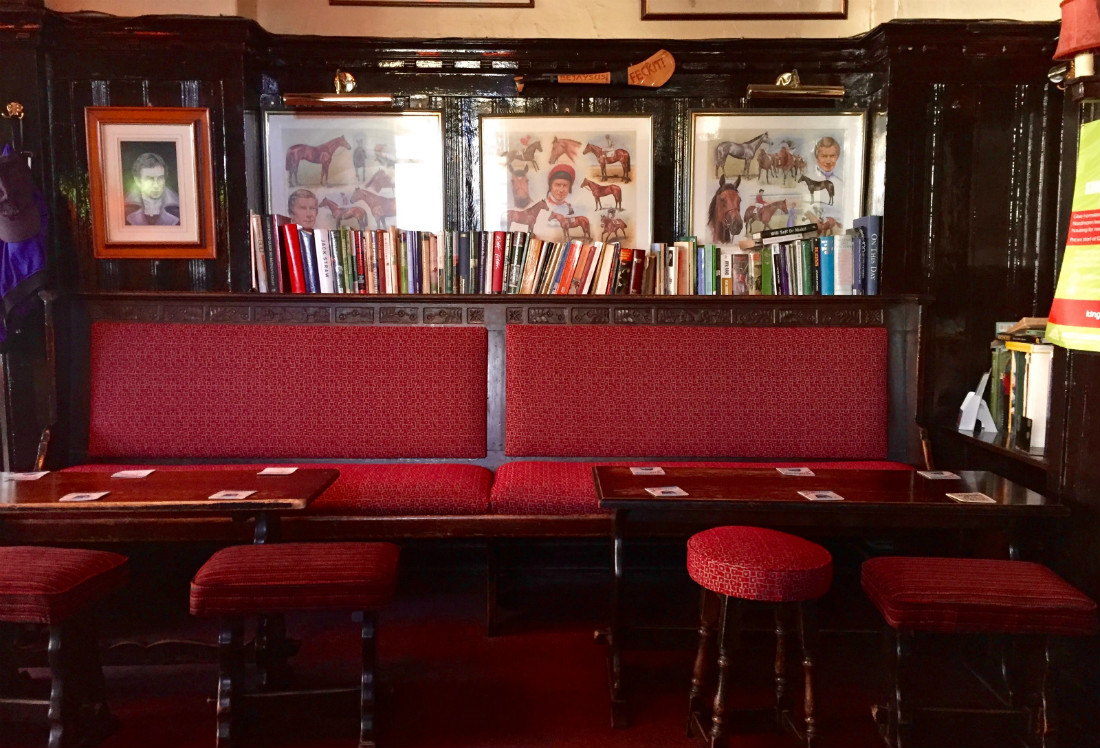
Curtis: I’ve taken a lot of visitors around town on pub crawls around London lately, and it’s funny that Will mentioned The Harp because that’s often the first place I take people, especially Americans who I want to deliver their expectation of British pub culture, and I want to deliver them a beer that might exceed those expectations.
I can give them Harvey’s Best, Fuller’s London Pride, Plato, Dark Star Hophead, but then they also always have The Kernel, which they’re always excited to try because it’s a brewery they’ve heard of. I took someone from New Belgium to The Harp this year, and he had never really been outside of Colorado, and it not only fulfilled his expectations, but it set a new parameter of expectations he didn’t have when he first flew in to London.
It was quite delightful to see that.
Something else I got to do this year was show around some Belgians from Brussels and Ghent who got in touch with me and wanted to learn about craft beer. I took them on a little tour of East London, including the Kings Arms in Bethnal Green, Mother Kelly’s, and I took them to meet the guys at Urban Farmhouse Project at Redchurch, which may or may not be continuing as it is, but at the time it was doing some incredible spontaneous stuff.
I took them to Hackney Wick to Howling Hops, CRATE, and to Mason & Company because Brussels, for all its beer culture, has nothing like that little East London crawl. I took them to The Cock Tavern, as well, and they got to try beers and experience a culture that was so different to the crawl in Brussels, and as someone who’s crawled in Brussels it was really fascinating to share these ideas.
At the end, they said, “Oh, by the way, this is happening in Brussels, here’s a list of all the places you don’t go to that no one knows about. We’ll kill you if you tell anyone, but this is kind of happening in Brussels, but nothing like this.” People in Brussels want to replicate London’s craft beer scene. I just found that absolutely fascinating.
That Hackney Wick area is just great. You take an American there and it’s like, ‘yeah, this is all right, but it’s not quite as good as what we’re doing in San Diego or Chicago’ or whatever, but take a Belgian to Hackney and it’s fascinating.
Hawkes: That’s a really interesting point. When I speak to young Belgians and ask them if they are inspired by American brewers, they say yes, but they can’t really get [their beers]—we’re inspired by London. For young Belgian brewers, and lots of people who are getting into beer, London is like a real leading light in European beer.
BT: What exactly is it about London?
Hawkes: It’s four or five things, but London is a city of more than 8 million people; it’s a very diverse place. London beer, for me, has a tradition—an almost lost tradition—that with the exception of perhaps Munich is pretty much unparallelled in the world. The styles that came out of London in the 19th century… nobody can really match that, but it all got lost in the 70s and 80s.
Now obviously there are a lot of Americans coming in and America reminding us of what we are, and I think one of the great things is that people in London want to brew London styles. They know it’s the American hopped pale ales that really sell, but they still want to do the stouts, the porters, and the other beers that pay tribute to that tradition.
That’s what London is—it has tradition, it has modernity, and it really is at the crossroads of those two things. That’s what makes it, in its own way, quite special, because Europe is tradition and American is modernity, and that’s where London sits. It’s special.
Curtis: It’s interesting because you go to some cities like Manchester, which still has a lot of its culture intact. I remember talking to a guy who lived in Manchester a long time ago who pulled down the Boddington’s chimney. London actually got kind of devastated; it lost Truman’s, Young’s moved out, Courage… and I can’t speak to how proud I am of what London’s beer scene is now.
You talk about The Kernel; look at what Beavertown and Fourpure have done. They’re building breweries that are going to turn over more than 30,000 barrels a year and they’re still growing, and then you see guys like Pressure Drop and Partizan expanding, and you’re like, okay, they’re just making like a five-barrel batch every week and they’ve figured out a way to turn that into a business. You’re still seeing new guys come along like Affinity Brewing with so many ideas, and so many more brewpubs come along.
London seems to be this very resilient town. There’s always a lot of scrutiny on it, but I feel like it’s becoming the vibrant beer town it deserves to be. I like the way it’s been quite playful with and aware of its immaturity, where I think a lot of other cities in the UK might have been quite boisterous about making exceptional beer. London brewers tend to say they’re making all right beer, but come back next year and we’ll be making incredible beer.
There are always people that don’t manage to lift themselves, but the majority of brewers are lifting themselves to a very high standard.
Hawkes: The thing about anything that happens is that there are people who will get better and better and better and drive the quality. The complaint about London brewing three or four years ago was that there were lots of breweries, but the quality wasn’t that high. My view, however, was always that there would be people who would drive that quality because they wanted to make a better product and because of competition.
I think you see now that there are 20 or 25 London breweries whose products you can trust. There are over 100 breweries in London, and I’m not saying the other ones don’t make good beer, but there are 20 or 25 that are getting bigger and the beer is consistent.
This is always what I thought would happen; I’m regularly wrong about things, but on this occasion I was right. I thought the demand and desire for beer, and the commitment of the people running the breweries, would get to this stage, and I think it will get better, as well.
I told someone the other night that I think London is becoming, again, the beer capital of Europe.
Curtis: I agree with Will.
Hawkes: We have that tradition, but we also have that spirit of adventure, which is really rare, and that’s one of the beautiful things about London. I’m always optimistic about London—it’s resilient, it bounces back, it never gives in, and that’s why I love it.

Recent Stories by Matthew Curtis:
+ A Diamond in the Flesh — Getting to the Heart of New Zealand Beer
+ Take a Straight and Stronger Course — Lost & Grounded Brewers in Bristol, UK
+ Sons of the Pioneers — Northern Monk Brew Co in Leeds, UK
 Recent Stories by Will Hawkes:
Recent Stories by Will Hawkes:
+ Marko Husak: Bundobust’s Recipe for Success
+ A Journey Through the Past: London Brews Porter Again
+ To Strasbourg, in Search of a Tale from the Crypt
BT: It seems like a few years ago everybody in London wanted to make a hoppy, US West Coast-style IPA. Then it was on to kettle sours, Berliner Weisse, and other low-alcohol styles, and now it seems like barrel-aging and, actually, more lagers. Where is London brewing now going in the next few years?
Curtis: Don’t forget the saison wars of 2013, too.
Hawkes: This is the way it always kind of happens in Britain. We say American breweries are fantastic, let’s do it just like the Americans. But then it reminds you that, say, Sierra Nevada’s pale ale was based on Fuller’s ESB, so let’s rediscover that and have a look at what we’ve lost over the years. I really want to see, and hope to see, a return to the best virtues of British brewing, whether that be a classic best bitter, or a barleywine, or a really good porter and stout.
I think alongside the more modern things that are happening that is a really healthy thing to see in the London beer scene, too. You see it already with a lot of the dark beers London breweries are making. Maybe not next year, but over the next five years that will definitely be a change.
Curtis: I agree with that, and I think in 2018 we are going to see a lot more traditional British beers; styles like ESB and bitter are going to become appealing. A lot of that comes with capacity, as well, because as breweries expand they need to produce beers that are more accessible because they need to sell more beer and they’ve got more space. We’ll see more lagers—and we’re already seeing a bit of a lager trend with Five Points, Lost & Grounded, and guys like that.
What I’ve always admired about British people is their ability to absorb culture and make that their own. You see things like the New England IPA trend, which personally I feel is far more than just a trend because if it was just a trend it would have died already, but it’s been going on four or five years. You see guys like Brew by Numbers, Verdant, and Northern Monk really adapt that. Brew by Numbers are a great example who say that, well, we make beers that are kind of like NEIPA, but they’re not as sweet—they’re dry, and we take that influence from Belgium.
It comes back to what Will was saying in that we make things our own, and we are able to look at whatever is happening in global beer culture and put our own spin on it.
We’re also going to see a lot more slow fermentation projects. It’s a sign of the times that BrewDog are investing in a sour, wood-aging facility in which beers are going to take years or months to make. Cloudwater are getting a coolship, and Burning Sky already have beers from the coolship in the barrel. In four or five years the Belgians are going to have to raise their game because… okay, well, they probably won’t have to raise their game.
Hawkes: The game is pretty high.
Curtis: The game is very high. Let’s just say we are going to see a lot more “wine-ified” beers and spontaneous beers.
Hawkes: Gale’s Prized Old Ale, which is the last survivor of that old English tradition—let’s hope we see more of that, because that adds something new back into the beer world that was lost. When you look at those types of beers they’re all in Belgium now. Okay, Greene King, and they don’t really share it the way they should, they’ve still got that tradition there, but Gale’s doesn’t really exist anymore.
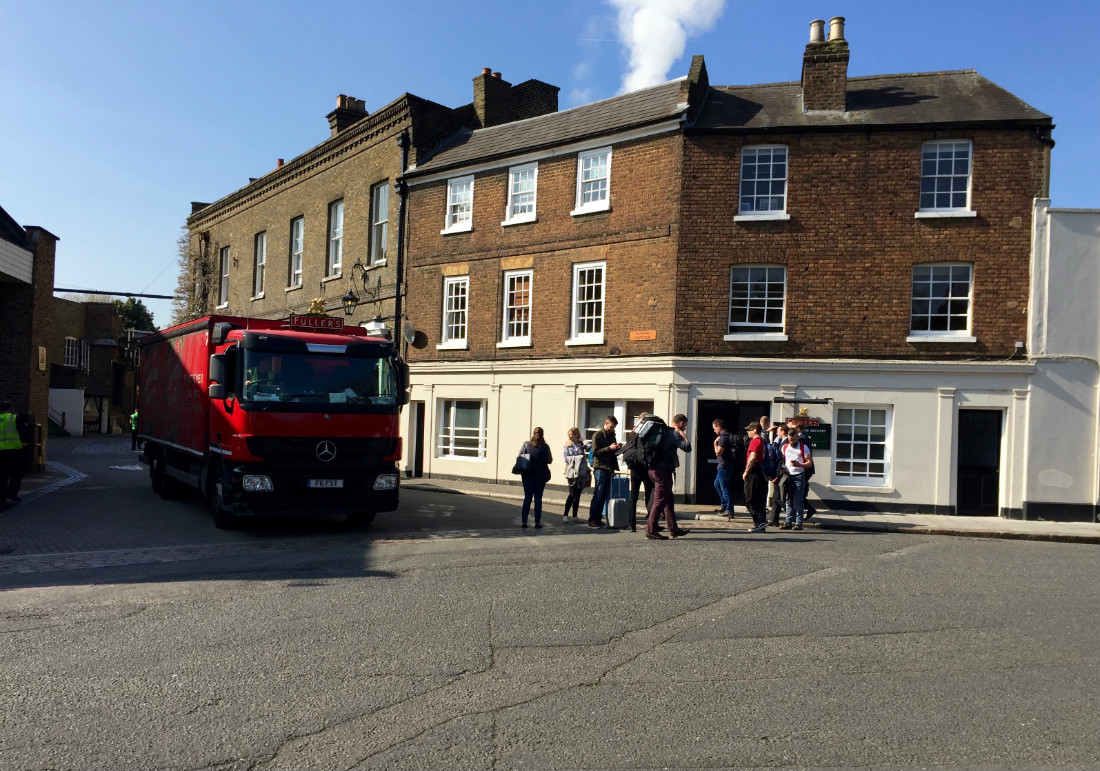
Let’s see if we can get back to that and start looking at some of those old English traditions. I mean, Brettanomyces is called Brettanomyces because it’s British yeast and it gives a distinctive flavor of British beers. Why don’t we see how we can explore that?
Continue with the second part of our interview with Matthew Curtis and Will Hawkes, when things get a wee bit messy, here.
####
Matthew Curtis is a freelance beer writer, photographer, and former UK Editor for Good Beer Hunting. He also regularly contributes to Ferment Magazine, and has written for Belgian Beer & Food and The Brewers Journal, amongst other publications. Find him on Twitter and Instagram.
Will Hawkes is a drink, food and travel writer, the author of Craft Beer London, and founder of London Beer City. He contributes to the FT, Washington Post, Observer Food Monthly, Daily Telegraph, and The Age. He was named British Beer Writer of the Year in 2013. He’s on Twitter and Instagram, too.



